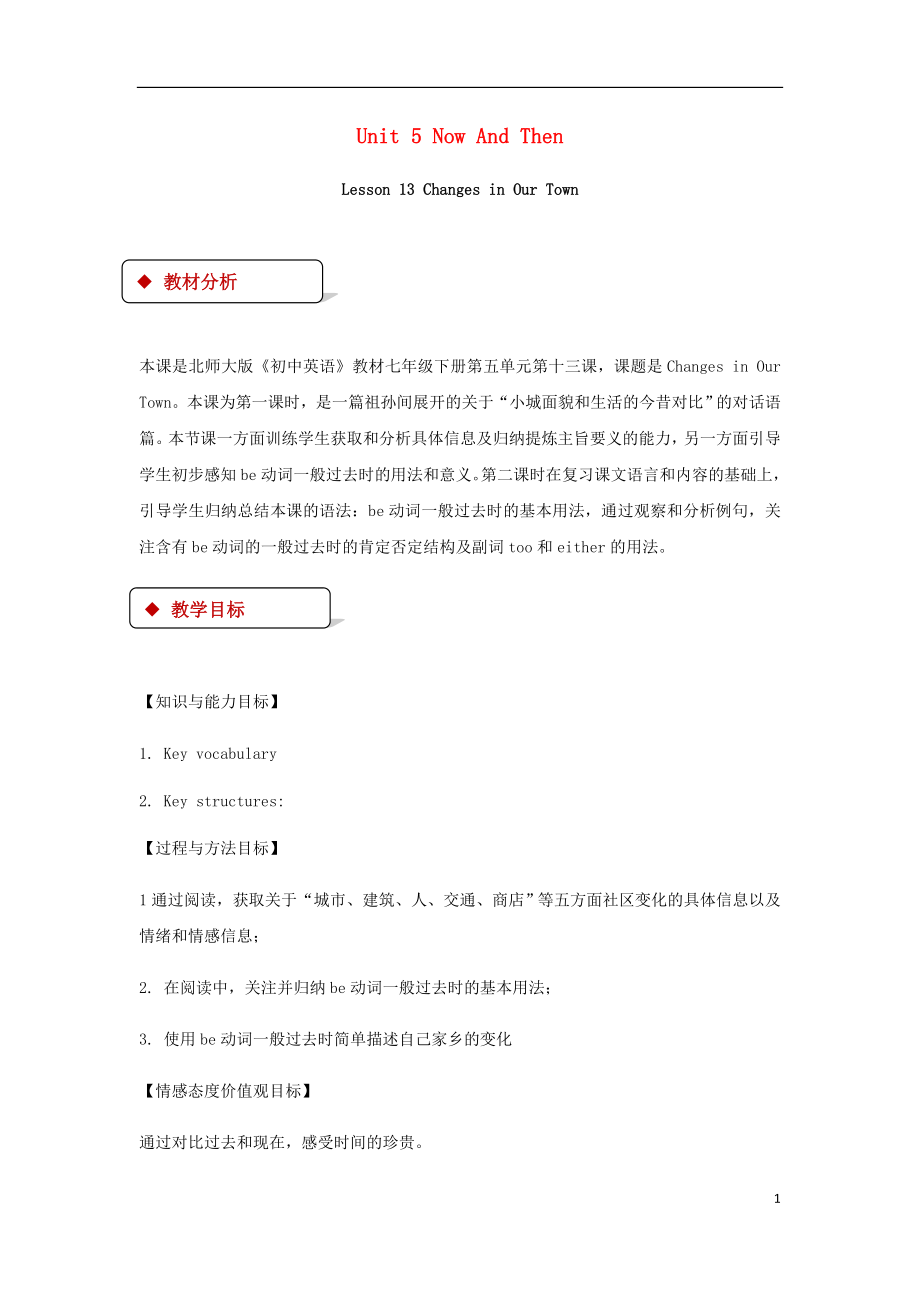《2018秋期七年級(jí)英語(yǔ)下冊(cè) Unit 5 Now and Then Lesson 13 Changes in Our Town教案 (新版)北師大版》由會(huì)員分享�����,可在線閱讀,更多相關(guān)《2018秋期七年級(jí)英語(yǔ)下冊(cè) Unit 5 Now and Then Lesson 13 Changes in Our Town教案 (新版)北師大版(4頁(yè)珍藏版)》請(qǐng)?jiān)谘b配圖網(wǎng)上搜索�����。
1、
Unit 5 Now And Then
Lesson 13 Changes in Our Town
◆ 教材分析
本課是北師大版《初中英語(yǔ)》教材七年級(jí)下冊(cè)第五單元第十三課�����,課題是Changes in Our Town�����。本課為第一課時(shí),是一篇祖孫間展開的關(guān)于“小城面貌和生活的今昔對(duì)比”的對(duì)話語(yǔ)篇�����。本節(jié)課一方面訓(xùn)練學(xué)生獲取和分析具體信息及歸納提煉主旨要義的能力�����,另一方面引導(dǎo)學(xué)生初步感知be動(dòng)詞一般過(guò)去時(shí)的用法和意義�����。第二課時(shí)在復(fù)習(xí)課文語(yǔ)言和內(nèi)容的基礎(chǔ)上�����,引導(dǎo)學(xué)生歸納總結(jié)本課的語(yǔ)法:be動(dòng)詞一般過(guò)去時(shí)的基本用法�����,通過(guò)觀察和分析例句�����,關(guān)注含有be動(dòng)詞的一般過(guò)去時(shí)的肯定否定結(jié)構(gòu)及副
2�����、詞too和either的用法。
◆ 教學(xué)目標(biāo)
【知識(shí)與能力目標(biāo)】
1. Key vocabulary
2. Key structures:
【過(guò)程與方法目標(biāo)】
1通過(guò)閱讀�����,獲取關(guān)于“城市、建筑�����、人�����、交通�����、商店”等五方面社區(qū)變化的具體信息以及情緒和情感信息�����;
2. 在閱讀中�����,關(guān)注并歸納be動(dòng)詞一般過(guò)去時(shí)的基本用法�����;
3. 使用be動(dòng)詞一般過(guò)去時(shí)簡(jiǎn)單描述自己家鄉(xiāng)的變化
【情感態(tài)度價(jià)值觀目標(biāo)】
通過(guò)對(duì)比過(guò)去和現(xiàn)在�����,感受時(shí)間的珍貴�����。
【教學(xué)重點(diǎn)】
?提取關(guān)于“城市�����、建筑�����、人�����、交通�����、商店”等五方面變遷的具體信息,同時(shí)關(guān)注并歸納be動(dòng)詞一般過(guò)去時(shí)的基本用法�����。
【教學(xué)難
3、點(diǎn)】
如何引導(dǎo)學(xué)生對(duì)文本信息進(jìn)行深入思考�����,以及如何在設(shè)置的語(yǔ)境中使用be動(dòng)詞一般過(guò)去時(shí)簡(jiǎn)單描述自己家鄉(xiāng)的變化�����。
◆ 課前準(zhǔn)備
◆
Tape recorder, Multimedia
◆ 教學(xué)過(guò)程
Step 1. Brainstorm
Show a picture of a city which has changed a lot and ask some questions.
Step 2. Warm-up
Introduce the Key Adjectives and th
4�����、en play the recording of them. Show pictures to help the students put the adjectives in opposite pairs and then describe the pictures with the Key Adjectives.
Step 3. Pre-reading
1. Play the recording of the dialogue and ask the students to read aloud with the speaker. Show the students the table
5、and help them recall the changes in the town and ask them to work in pairs and talk about the changes in the town. Get the students to have a free talk about the changes in their hometown or Mentougou. Help the students look at the changes correctly. Show the students some pictures and some sayings
6�����、about time to get them to learn to tr
2. Introduce the postcard, and give them the questions. And then play the tape for them.
Go over the questions and listen to the tape to get the answers.
3. Check the answers.
Step 4. Reading
1st?reading: Ask the students to focus on the beginning to find
7、 out the correct answers to the two questions.?Who are talking??What are they talking about?
2nd?reading: Show the students how to find out the key words to complete the dialogue. Call back the answers in a whole-class setting.
3rd?reading: Ask the students to read and find out the 5 aspects they
8�����、mentioned in the dialogue. And then complete the table.
Step 5. Talk about your homework.
Talk about:
the city, buildings, people, traffic, shops, your house, the schools, the roads/streets, the restaurant, the park…
Step 6 Group talk:
You can use the following sentences to describe the ch
9、anges about school, room, teacher, parents, classmates and town.
For example,
The trees are ______ now, but they were _______ before.
The canteen is _____ now, but it was __________before.
The building is _____now, but it was ___________before.
Step 7 Homework
1. To read the dialogue aloud.
2. To write a passage about the changes of your hometown.
◆ 教學(xué)反思
略。
4
 2018秋期七年級(jí)英語(yǔ)下冊(cè) Unit 5 Now and Then Lesson 13 Changes in Our Town教案 (新版)北師大版
2018秋期七年級(jí)英語(yǔ)下冊(cè) Unit 5 Now and Then Lesson 13 Changes in Our Town教案 (新版)北師大版

